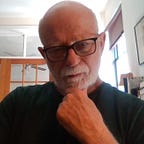What Happens After You Die
And Who Decides?
Back in the day when CBS News anchor Walter Cronkite was America’s Most Trusted Person, he sat for an interview with talk-show host Dick Cavett. After a couple of warmup questions, Cavett leaned in with an impish grin and asked: “So Walter, what happens after you die?”
Cronkite brushed it off as mischievous flattery. He was 60-something at the time and lasted a couple more decades.
At 80, I find the question harder to dismiss. Here’s what I’d like to know: Do we have any say in what happens?
Maybe we do.
I may be risking Hell for my impertinence, but here’s a theory I’ve held for many years and rarely told anyone: We may not have a vote, but we have a voice, and it doesn’t hurt to ask for what you want.
It may be that consciousness continues after death, like a dream. The Tibetan Book of the Dead says that just as dreamers don’t know they’re dreaming, the dead don’t know they’re dead. Dreams begin with desires. And Heaven may just be your heart’s desire.
I don’t believe a heavenly court weighs your good and evil deeds and gives you the place your life deserves. I think judgment comes in the hour of your death, and where you’re at determines where you go.
Your heart’s desire is part of where you’re at. It may be the main thing or even the whole thing in that hour. (On the other hand, maybe it’s all predestined. What we experience as desire may be only a premonition, a foretaste of heaven.) In any case, it’s a decisive moment. This is why Catholics ask Mary to pray for them “now and at the hour of our death.”
I’m an Episcopalian, a choice made late in life when I decided to go with what appealed to me. And Episcopalians in New York City have many places to go.
At the corner of Fifth Avenue and 90th Street, there’s the Church of the Heavenly Rest. On a recent visit, I found it spacious and dark, perfumed with the breath of wealth. It didn’t appeal to me.
At one end of West 112th Street stands the Cathedral Church of St. John the Divine, the length of two football fields. The nave is surrounded by chapels and tombs, with light streaming in through a rose window that transforms each sunset into a spectroscopic splendor. I can do without such grandiose displays.
Besides those, there are Episcopal churches small and large, rich and poor, high and low.
My church is St. Michael’s, at 99th and Amsterdam — an airy, light-filled vault with a Tiffany stained-glass window as wide as the altar below. It depicts the scene from the Book of Revelation, when “war broke out in Heaven” (12:7). In the foreground is the Archangel Michael, leading the Army of God in battle against the forces of evil. Behind him is the Host of Heaven, rank on rank, receding to a distant horizon.
Once I had hoped to relax in heaven and listen to the music of the spheres. But now, as long as the battle goes on, I’d like to stay in it. Or bear witness and write it.
My epiphany came as a journalist, in Tiananmen Square in 1989. CBS News was there for the beginning of the end of the biggest political protest in history.
At the height of the Chinese movement for democracy, a million protesters were in the square — millions more in cities all over China. Their demands were modest: more freedom, more representation, less corruption. From their mood, it seemed they would be happy with a simple acknowledgment that the voice of the people had been heard. But day after day there was no word from Communist Party leaders, holed up in a palace a few blocks from the square.
After a week they came out at dawn for a photo-op “visit” with student leaders — as if they cared for them! A few hours later, army helicopters flew low over the square. A tinny female voice sounded from loudspeakers:
“Martial law has been declared in Beijing,” she said. “The situation is very dangerous. Go home immediately!” We tried to report it, but they pulled our plug. Two weeks later, in the dark of night, the army invaded the square and crushed the protest with tanks and gunfire.
By then we journalists were long gone. But, in the moment when that disembodied voice spoke out, I flashed on the true nature of history. It appeared to be just what the Bible says it is — a fight to the finish between good and evil, truth and lies, darkness and light.
I believe Plato when he wrote that our lives are just an indistinct shadow of an ideal realm. And I believe Martin Luther’s words in “A Mighty Fortress is our God”:
And though this world with devils filled should threaten to undo us/ We will not fear, for God has willed his Truth to triumph through us.”
The cosmic battle between good and evil rages within me, as well as out in the world. But as Thomas Aquinas wrote, we’re judged not on what we do, but what we love. If you love to fight for what’s right, tell Uncle Sam to go to Hell, and sign up with St. Michael.
When war breaks out in Heaven, the Truth will be revealed. And if, as in the Book of Revelation, a voice from heaven says “Write this” — I will write.
And this time, no one can pull the plug.
— Copyright 2021 by Tom Phillips
